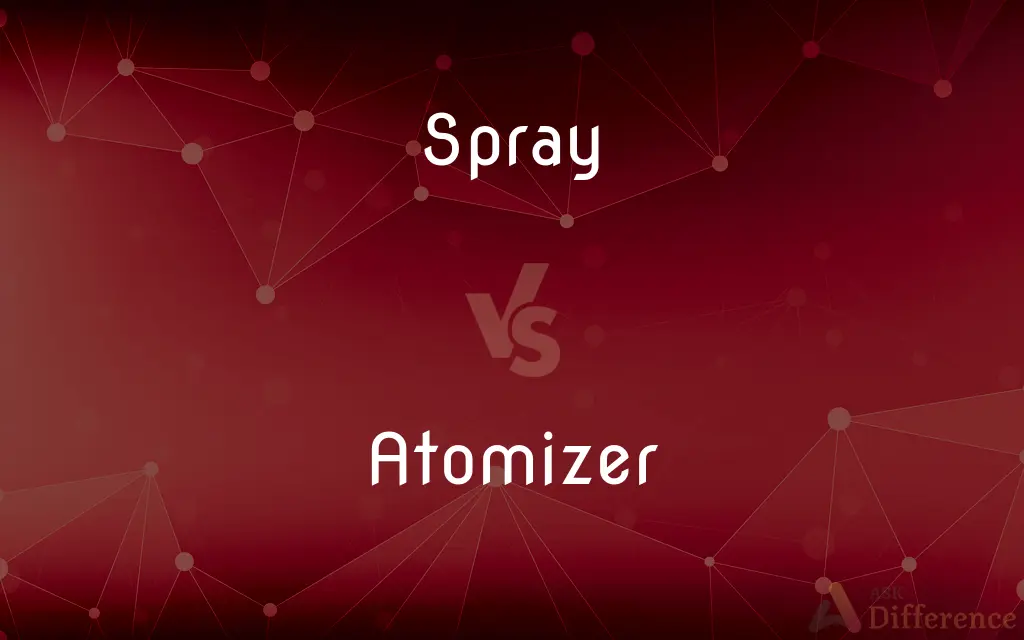Spray vs. Atomizer — What's the Difference?
Edited by Tayyaba Rehman — By Fiza Rafique — Updated on April 24, 2024
Spray refers to the act or result of dispersing liquid in droplets, while an atomizer is a device specifically designed to create a fine mist of liquid.

Difference Between Spray and Atomizer
Table of Contents
ADVERTISEMENT
Key Differences
A spray is generally understood as the action of forcing liquid through a small opening to break it into droplets, which can be applied across various contexts from gardening to personal hygiene. Whereas an atomizer is a type of spray device that is especially engineered to produce a very fine mist, making it ideal for applications requiring a gentle, even distribution.
In terms of functionality, sprays can be created by various means including trigger pumps, aerosols, or even simple squeeze bottles. On the other hand, atomizers often utilize a more complex mechanism that may include a pump or a propellant to finely disperse the liquid.
The term 'spray' can be used both as a noun and a verb, indicating the action and the result. Whereas 'atomizer' is typically a noun, referring specifically to the device itself.
Sprays are versatile and can be found in many household and industrial products from cleaners to paints. Atomizers, however, are more commonly associated with specific uses such as perfumes or pharmaceuticals where precision in droplet size is crucial.
The choice between a spray and an atomizer often depends on the needed precision and fineness of the mist. Sprays are suitable for a broader coverage, while atomizers are better for targeted, delicate applications.
ADVERTISEMENT
Comparison Chart
Definition
Method of dispersing liquid in droplets.
Device designed to create a fine mist.
Common Uses
Gardening, cleaning, painting.
Perfumes, medical nebulizers.
Mechanism
Can vary from simple squeeze to aerosols.
Often involves pumps or propellants.
Application Type
Broad or targeted depending on the design.
Primarily fine, precise misting.
Part of Speech
Used as both a noun and a verb.
Primarily used as a noun.
Compare with Definitions
Spray
A dispersion of liquid as droplets ejected from a container.
She used a spray bottle to mist the plants.
Atomizer
In pharmaceuticals, used for delivering medication.
The doctor prescribed a nasal atomizer for her allergies.
Spray
To cover an area uniformly with small droplets.
Spray the cake with edible glitter.
Atomizer
A tool in cosmetic applications for even distribution.
She used an atomizer to apply her makeup setting spray.
Spray
The act of applying liquid in a scattered manner.
He will spray the car with a hose.
Atomizer
Used specifically for finer mist applications.
The painter used an atomizer for the delicate shading.
Spray
To eject liquid under pressure.
The damaged pipe began to spray water.
Atomizer
Often used in personal care for applying scents.
His atomizer broke, so he couldn’t apply his cologne.
Spray
A product designed to emit liquid in droplets.
They bought a bug repellent spray.
Atomizer
A device that converts liquid into a fine spray.
She filled her atomizer with her favorite perfume.
Spray
Water or other liquid moving in a mass of dispersed droplets, as from a wave.
Atomizer
A device, as on a perfume bottle, for breaking a liquid up into a fine spray of droplets.
Spray
A moving mass of particles or projectiles
A spray of bullets.
Atomizer
A device, as in an e-cigarette, that uses heat to vaporize a liquid or to release volatile compounds from a solid; a vaporizer.
Spray
A fine jet of liquid discharged from a pressurized container.
Atomizer
An instrument for reducing a liquid to spray or vapor for disinfecting, cooling, medical use or perfume spraying.
Spray
A pressurized container; an atomizer.
Atomizer
One who, or that which, atomizes; esp., an instrument for reducing a liquid to spray for disinfecting, cooling, or perfuming.
Spray
Any of numerous commercial products, including paints, cosmetics, and insecticides, that are dispensed from containers in this manner.
Atomizer
A dispenser that turns a liquid (such as perfume) into a fine spray
Spray
A small branch bearing buds, flowers, or berries.
Spray
Something, such as a decorative motif, that resembles such a branch.
Spray
To disperse (a liquid, for example) in a mass or jet of droplets, particles, or small pieces.
Spray
To apply a spray to (a surface); hit with a spray.
Spray
To discharge sprays of liquid.
Spray
To be directed or dispersed in a spray.
Spray
(Zoology) To urinate on various objects as a way of marking territory.
Spray
A fine, gentle, dispersed mist of liquid.
The sailor could feel the spray from the waves.
Spray
(figuratively) Something resembling a spray of liquid.
Spray
(countable) A pressurized container; an atomizer.
Spray
(countable) Any of numerous commercial products, including paints, cosmetics, and insecticides, that are dispensed from containers in this manner.
Spray
A jet of fine medicated vapour, used either as an application to a diseased part or to charge the air of a room with a disinfectant or a deodorizer.
Spray
A side channel or branch of the runner of a flask, made to distribute the metal to all parts of the mold.
Spray
A group of castings made in the same mold and connected by sprues formed in the runner and its branches.
Spray
The allocation and filling of blocks of memory with the same byte sequence, hoping to establish that sequence in a certain predetermined location as part of an exploit.
Spray
(Australia) A loud scolding or reprimand, usually delivered by a sports coach or similar figure.
Spray
(countable) A small branch of flowers or berries.
The bridesmaid carried a spray of lily-of-the-valley.
Spray
(countable) A collective body of small branches.
The tree has a beautiful spray.
Spray
(uncountable) Branches and twigs collectively; foliage.
Spray
An orchard.
Spray
(countable) An ornament or design that resembles a branch.
Spray
(transitive) To project a liquid in a dispersive manner toward something.
The firemen sprayed the house.
Using a water cannon, the national guard sprayed the protesters.
Spray
(ergative) To project in a dispersive manner.
Spray some ointment on that scratch.
The water sprayed out of the hose.
Spray
To project many small items dispersively.
Spray
To urinate in order to mark territory.
Spray
To allocate blocks of memory from (a heap, etc.), and fill them with the same byte sequence, hoping to establish that sequence in a certain predetermined location as part of an exploit.
To spray the heap of a target process
Spray
To pass (a ball), usually laterally across the field and often a long distance.
Spray
To kick (a ball) poorly and in an unintended direction.
Spray
To give unwanted advice.
Spray
A small shoot or branch; a twig.
The painted birds, companions of the spring,Hopping from spray to spray, were heard to sing.
Spray
A collective body of small branches, or cut flowers with long stems; as, the tree has a beautiful spray; many sprays were sent in condolence to teh funeral home.
And from the trees did lop the needless spray.
Spray
A side channel or branch of the runner of a flask, made to distribute the metal in all parts of the mold.
Spray
Water flying in small drops or particles, as by the force of wind, or the dashing of waves, or from a waterfall, and the like.
Spray
A jet of fine medicated vapor, used either as an application to a diseased part or to charge the air of a room with a disinfectant or a deodorizer.
Spray
To let fall in the form of spray.
Spray
To throw spray upon; to treat with a liquid in the form of spray; as, to spray a wound, or a surgical instrument, with carbolic acid.
Spray
A pesticide in suspension or solution; intended for spraying
Spray
A dispenser that turns a liquid (such as perfume) into a fine spray
Spray
A quantity of small objects flying through the air;
A spray of bullets
Spray
Flower arrangement consisting of a single branch or shoot bearing flowers and foliage
Spray
Water in small drops in the atmosphere; blown from waves or thrown up by a waterfall
Spray
A jet of vapor
Spray
Be discharged in sprays of liquid;
Water sprayed all over the floor
Spray
Scatter in a mass or jet of droplets;
Spray water on someone
Spray paint on the wall
Spray
Cover by spraying with a liquid;
Spray the wall with paint
Common Curiosities
What is a spray?
A spray is a way of dispersing liquid into droplets through various mechanisms.
What are common uses of a spray?
Sprays are commonly used for watering plants, cleaning surfaces, and applying chemicals.
Can any liquid be used in an atomizer?
Typically, only liquids that are thin enough to be misted without clogging are used in atomizers.
Is a spray bottle the same as an atomizer?
No, spray bottles can produce a range of droplet sizes, while atomizers specifically create a fine mist.
What types of industries use atomizers?
Industries such as perfumery, pharmaceuticals, and cosmetics use atomizers.
How does an atomizer work?
An atomizer uses a fine nozzle and often a pump to create a mist.
How can I tell if I need a spray or an atomizer?
It depends on the application’s need for mist fineness and area coverage.
Are atomizers more expensive than regular sprays?
Often, due to their more complex mechanisms.
Why would one use an atomizer instead of a spray?
Atomizers are chosen for applications requiring a delicate, even distribution of liquid.
Can sprays be used for medical purposes?
Yes, sprays are often used in medical treatments, such as in throat sprays.
Share Your Discovery

Previous Comparison
Picture vs. Figure
Next Comparison
Diamante vs. DiamondAuthor Spotlight
Written by
Fiza RafiqueFiza Rafique is a skilled content writer at AskDifference.com, where she meticulously refines and enhances written pieces. Drawing from her vast editorial expertise, Fiza ensures clarity, accuracy, and precision in every article. Passionate about language, she continually seeks to elevate the quality of content for readers worldwide.
Edited by
Tayyaba RehmanTayyaba Rehman is a distinguished writer, currently serving as a primary contributor to askdifference.com. As a researcher in semantics and etymology, Tayyaba's passion for the complexity of languages and their distinctions has found a perfect home on the platform. Tayyaba delves into the intricacies of language, distinguishing between commonly confused words and phrases, thereby providing clarity for readers worldwide.














































